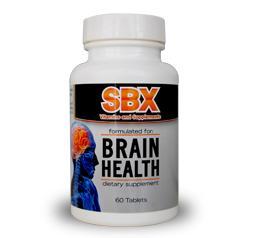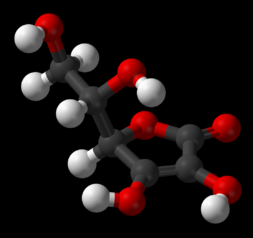Antioxidants - Treatment for Schizophrenia
Antioxidants & Schizophrenia Treatment
Why YOU need SBX & Antioxidants:
Research indicates that oxidative mechanisms play a role in schizophrenia. The doctors performing this research have pointed out that antioxidants can protect against oxidation and may be an effective therapeutic treatment to reduce the symptoms of schizophrenia. This is particularly so when antipsychotics are taken together with antioxidants.
Research has shown that patients with schizophrenia have a defect in antioxidant defence that may leave highly vulnerble brain cells open to attack by reactive oxygen species. Reseachers have concluded that "antioxidant supplementation may be of beneficial effect in combination with antipsychotics in schizophrenia patients."
Because a 2012 review of all the highest quality studies that have been conducted globally concluded that antioxidants do improve symptoms of schizophrenia.
The 2012 Review: A review of all relevant studies called "Does antioxidant supplementation improve symptoms in schizophrenia patients" was conducted in 2012. The review looked at studies that had considered the effect of antioxidants when used with antipsychotics to treat the symptoms of schizophrenia. It was conducted by the Erasmus University Medical Centre, and included only the 4 most robust studies from a pool of 14.
All studies except one were of the gold standard, randomized, double blind, placebo controlled variety that can be expected to provide accurate and scientific results. You can read more about the review in our article here . The study concluded that the use of antioxidant supplementation, in addition to antipsychotics further improved the symptom symptoms in patients with schizophrenia and could especially benefit patients suffering from positive symptoms.
The 4 studies included were:
- Zhang et al 2001;
- Atmaca et al;
- Dakhale et al; and
- Berk et al.
Because several studies have indicated that higher levels of free radicals (i.e. oxidants) correlate with higher positive and negative symptoms. A defective antioxidant defense leaves brain cells susceptible to damage and that treatment with antioxidants may prevent further injury and help recovery.
The Li HC study: a clinical study was conducted on 46 patients in China in 2006. It investigated both the oxidant and antioxidant systems by looking at a). the blood oxidative-antiovidative level in schizophrenic patients compared to healthy individuals and b). the level of symptoms shown by patients with varying levels of oxidants and antioxidant in their blood. The severity of the psychiatric symptom of participants was assessed with brief psychiatric rating scale (for positive symptoms) and the negative syndrome scale (for negative symptoms) on the blood draw day. Blood samples were taken to measure the levels of nitric oxide and lipid peroxide (both oxidants) in plasma as well as the levels of antioxidants.
A comparison showed:
- That the level of nitric oxide and lipid peroxide, both free radicals, was significantly higher in the patient group than the healthy individuals;
- Higher levels of free radicals meant more symptoms of schizophrenia;
- The activities of enzymes critical to the antioxidants were less in the patient group than in the healthy individuals; and
- Lower levels of enzyme activity meant more symptoms of schizophrenia.
The study showed that the free radical metabolism and the antioxidant defense systems of the body do not function as they should in schizophrenia patients. Excess free radicals formation may play a critical role in the cause of schizophrenia. Doctors conducting the study felt that using antioxidants might be an effective therapeutic approach to partially alleviate or prevent the symptoms of schizophrenia.
Osman Verit Study: This 2009 study found the main concern was the lower levels of total antioxidants in people with schizophrenia rather than the high levels of oxidants. These lower levels of antioxidants were inversely correlated to PANSS scores (ie the levels of positive and negative symptoms of a patient) meaning that lower the levels of antioxidants in a patient, the greater his positive and negative symptoms. The author of this study concluded that there is a defect in the antioxidant defense system in schizophrenia. He said that the oxidative stress that contributes to the schizophrenia may be related to this defensive defect.
The Mahadik study: A clinical study was conducted by Mahadik et al., in the USA in 2001 to examine the increasing amount of evidence that shows oxidative injury as contributing to the pathophysiology of schizophrenia. Mahadik et al. concluded that adjunctive treatment with antioxidants (e.g. Vitamins E, Vitamin C, Vitamin B-carotene and quinones) in the initial stages of schizophrenia may prevent further oxidative injury and thereby reduce and prevent further possible deterioration of associated neurological and behavioral deficits in schizophrenia.
The Lee study: This research team wanted to explore the reason for low antioxidants levels of individuals with schizophrenia. This study again examined the difference in the antioxidant level between patients with schizophrenia and healthy controls, but it also looked at the difference between the schizophrenic patients who had never taken antipsychotics, with a first episode (FSPR) and the risperidone-treated chronic schizophrenia (RCSPR) patients.
The plasma albumin, bilirubin and uric acid (all antioxidants) levels were determined in 47 FSPR and 55 RCSPR patients who met the criteria for schizophrenia, and in 68 controls. The albumin and bilirubin levels were significantly lower in the schizophrenic patients compared to the controls, although there was no significant difference between the FSPR and RCSPR patients. The bilirubin level was significantly lower in the treated chronic subgroup of the patient group.
Vitamin C
Because supplementation of vitamin C with atypical antipsychotics reducesses oxidative stress and improves outcome of schizophrenia.
The Dakhale Study: This 2005 study examined the effect of vitamin C with Antipsychotics. The study look at the levels of malondialdehyde (a marker for oxidative stress) and ascorbic acid (an antioxidant) in the blood and also brief psychiatric rating score in schizophrenia patients. This was an eight week double-blind, placebo-controlled, noncrossover study of 40 schizophrenia patients.
Deceased ascorbic acid and increased malondialdehyde were found in blood. These levels reversed significantly after treatment with vitamin C and atypical antipsychotics when compared to placebo with atypical antipsychotics. Brief psychotic rating score also improved a significantly more with Vitamin C compared to placebo.
The Suboticanec study: A clinical study was conducted by leading doctors Suboticanec and others using vitamin C. They found patients with schizophrenia on the same hospital diet as control group subjects had substantially lower levels of vitamin C. After 70mg of vitamin C was administered for 4 weeks, there was no longer any difference in vitamin C levels between patients with schizophrenia and control group subjects.
However, the urinary vitamin C excretion after the vitamin C loading test remained substantially lower in patients with schizophrenia. 1000mg of vitamin C was administered to enable urine of the patient with schizophreniato reach the same excretion level as the control group subject. The results of the study are in agreement with the hypothesis that patients with schizophrenia require higher levels of vitamin C than the average person.
Vitamin D
Because vitamin D supplementation can reduce the risk of schizophrenia in males.
The McGrath study: A clinical study by prominent doctor McGrath and others took place in Finland. Data was collected during the first year of life for male and female subjects. Data included the frequency and amount of vitamin D taken as a supplement. In males, the use of either irregular or regular vitamin D supplements was associated with a reduced risk of schizophrenia compared with no supplementation. In males, the use of at least 2000 IU of vitamin D was associated with a reduced risk of schizophrenia compared to those on lower doses. McGrath concluded that taking vitamin D as a supplement during the first year of life was associated with a reduced risk of schizophrenia in males.
What are vitamin A, vitamin C, vitamin D and vitamin E?
- Vitamin A: is needed for the healthy functioning of the brain and eye and can be found in 2 principal foods: retinol and carotenes.
- Vitamin C: is an essential nutrient and vitamin as it functions as an antioxidant (also known as L-asorbic or L-asorbase). It is found in fruits and vegetables.
- Vitamin D: isn’t a vitamin and isn’t found in food. It’s a hormone that has the ability to interact and affect more than 20,000 genes in the body.
- Vitamin E: is a fat-soluable compound that includes both tocopherols and tocotrienols. Vitamin E is found in corn oil, soybean oil, margarine, dressings, wheatgerm oil, sunflower and safflower oils.
Buy Supplements

SBX Supplements for Schizophrenia
SBX is a supplement for those suffering from schizophrenia. The formulation contains the different vitamins and natural ingredients that studies suggest may reduce the symptoms of schizophrenia and help with recovery from schizophrenia.
$29 per bottle (Total of 60 capsules)
Ingredients
Client’s testimonials

I started taking SBX with my prescribed antipsychotics and felt more alert and my mood became more positive. I had been out of work for some time and beginning to worry about money as I have limited health insurance, but now, I have just started a new, part-time job, in the food sector, and have even, much to my friends' surprise, started dating again! Thank you SBX! I won't go a day without this supplement.

My doc mentioned taking more supplements like ginkgo biloba, B vitamins etc with my meds. Buying a bunch of different vitamins is expensive so I tried SBX. Before I started SBX, my doc told me I was paranoid (which I still am btw) but the voices were really taking over me. The voices are still there, but I've noticed they've started to quieten a little...

